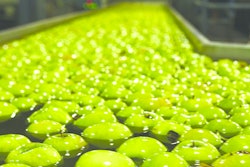New York: Food companies portray an increased interest in snack foods.
Facing stagnant growth in their base grocery business, packaged-food companies are increasingly turning to snacks as an avenue for growth. The companies hope to capitalize on American consumers who continue to snack more throughout the day, and on trends in developing markets, such as more women entering the workplace and the spread of modern retail formats.
Snacking "is a long-term trend and the future of eating," said Gary Stibel, chief executive of the New England Consulting Group, which has advised such clients as PepsiCo's Frito-Lay, the largest salty-snack player in the world by sales. "You and I will continue to snack more and sit down to a meal less."
Analysts and companies project that there's enough growth to go around in the $560 billion global snacks market, as measured by Euromonitor Inc., for most food companies to take a bite. So even as such smaller snack players as ConAgra Foods Inc. or General Mills Inc. try to get bigger in snacking, such larger players as PepsiCo Inc., which owns Frito-Lay, and Kraft Foods Inc. need not worry about losing any market share.
"There's plenty of room. The global market's very fragmented," said Lee Linthicum, Euromonitor's head of global food research.
Another incentive is the fact that snack prices can be raised more easily than those of some grocery staples, according to analysts. Snacks generally start at lower prices and offer the added value of convenience, for which shoppers are willing to pay more. They're also generally bought on a whim, such as when drivers fill up their tank at gas stations or shoppers pick up a prescription at a drug store, making them an afterthought that satisfies an urge.
The companies are attacking snacks in different ways. Frito-Lay is focusing this year on adding more premium- and lower-priced chips to its portfolio to capitalize on more growth in those price ranges. ConAgra, meanwhile, is introducing already-popped Orville Reddenbacher's popcorn in ready-to-eat bags. ConAgra's also unveiling a frozen Greek yogurt product in June that it will market as a snack rather than a dessert.
Kellogg Co. is taking the acquisitive route with its pending $2.7 billion deal for Pringles. General Mills also made a small deal, recently buying Food Should Taste Good Inc., which makes tortilla chips in such flavors as sweet potato and chocolate, to take advantage of the growth in snacks and natural products.
Kraft, perhaps, is embracing the divergent performances of snack and grocery foods most wholeheartedly with plans to separate its North American grocery business from its snacks division, which will include Oreo cookies and Cadbury candy. As for emerging markets, the company believes snacks are an easy way to penetrate, since snacking habits are just developing and are more similar among countries than are meals.
"The way that people snack from one market to another is a lot more similar than it is different," Kraft Foods Chief Executive Irene Rosenfeld said in a recent interview.
For companies other than Kraft, the growth traits that snacks exhibit may offset challenges that packaged food giants face in their traditional grocery businesses. Goldman Sachs analyst Jason English said food makers' sales are at risk of slowing this year as an improving economy causes more consumers to eat meals at restaurants, reversing a trend of eating more at home during the downturn. Moderating input costs also mean that food makers won't raise prices as fast, robbing companies of a sales driver.
The food industry faces a "sales-growth vacuum where volumes aren't there and prices aren't there," English said.
Snacks can pick up the slack, with sales volume holding up well to price increases. Some categories, like candy, can also still benefit from raising prices. This week, Goldman Sachs upped its rating on Hershey Co. to buy as it sees the chocolate company's sales holding up well. "You are seeing snack foods once again resume their leadership role as a growth driver in the industry," English said.



















